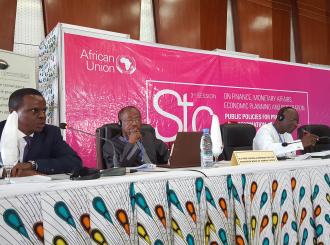
Yaounde, 8 March 2019 (ECA) – There is no alternative to the equation of "developing an African industrial fabric, capable of boosting our production and processing capacity, and reducing our dependence on other continents" recently argued the Prime Minister and Head of Government of the Republic of Cameroon, Dr. Joseph Dion Ngute – an observation that reflects ECA's current thinking on the structural transformation and diversification of African economies.
He was speaking at the 3rd session of the African Union’s (AU) Specialized Technical Committee (STC) on Finance, Monetary Affairs, Economic Planning and Integration, that rounds off in the Cameroonian capital, Yaounde, today.
Discussions on the session, which will feed the next African Union Heads of State Summit, focused on the theme: “Public Policies and Productive Transformation.”
It was an occasion for the AU Commissioner for Economic Affairs of the African Union – Prof Victor Harison to pay homage to the UN Economic Commission for Africa (ECA) and a host of other development institutions and partners in Africa for working tirelessly with the AU towards the productive transformation of the continent.
He said the concept of productive transformation points basically to diversifying economies towards high value-added sectors.
This brings to light the indispensable role of the secondary sector as the great basis for employment, which should contribute more than ever before to inclusive economic growth in Africa, as posited by Cameroon’s Minister of Finance Louis Paul Motaze, who hosted participants of the session.
What, then must Africa do to boost its secondary sector through massive industrialization?
According to Prof. Emmanuel Nnadozie, Executive Secretary of the African Capacity Building Foundation (ACBF), there are six key actions to take in this regard: 1) Building the right strategy and policy mix for massive industrialization; 2) Making critical commitments to unleash industrial capacity especially by developing energy and transport infrastructure; 3) Creating an enabling environment to attract investors; 4) Mobilizing internal and external support anchored on Africa’s self-belief on its ability to industrialize; 5) Taking action to make things happen, by “walking the walk and not just talking the talk”; and 6) Showing visionary and transformative leadership at all levels.
“This STC and other high-level events, such as the ECA Conference of Ministers and the Commission’s Subregional Intergovernmental Committee of Experts, provide an avenue for good quality dialogue to understand what the binding constraints and opportunities to productive transformation are, in order to define pathways towards achieving it,” said Antonio Pedro – Director of the Subregional Office for Central Africa of ECA.
He noted that, it was through such dialogue that the Douala Consensus on economic diversification through resource-driven and trade-induced industrialization was jointly adopted by ECA and representatives of its member States in Central Africa in September 2017.
“We are happy that some countries in the subregion are taking strides towards operationalizing the concept of economic diversification as outlined in the Douala Consensus. It is not a quick fix though. It requires comprehensive and sound diagnosis, integrated and strategic planning, bold and coordinated action from multiple actors. Our office is developing a body of knowledge and practice on economic diversification, which we are already deploying to the benefit of our member States and Central Africa in general” Pedro added.
In essence, “the starting point for productive transformation is economic diversification, beyond traditional farming and primary commodities, to include agro-processing, high value services for the digital economy and manufacturing,” argued Dr. K.Y. Amoako – former Executive Secretary of ECA who is now President of the African Center for Economic Transformation (ACET).
This, he said, would lead to “growth with depth,” which also requires engaging in competitive exports and leveraging technology.
“My take from this meeting is that there is need for better coordination among our African institutions to the extent that we would have common and coherent narratives on Africa’s development challenges and what needs to be done to address these challenges as well as concerted action to support the continent deliver the “Africa we want”, mooted Adam Elhiraika – Director of the Macroeconomic Policy Division at ECA.
One of such needed actions is to boost human capital development and establish credible institutions in the investment and business ecosystem in Africa.
“There is absolute need for an African credit rating agency – with a granular understanding of the reality of individual countries and Africa as whole which would then ensure a more accurate assessment of risks, challenges and opportunities thus resulting in credit ratings that reflect the realities on the ground,” he said.
ECA is currently supporting initiatives in this regard.
-ENDS-
Issued by:
The Sub-Regional Office for Central Africa
UN Economic Commission for Africa (ECA)
P.O. Box 14935 Yaounde, Cameroon
Tel: (+237) 222504348 / 222504315 / 222504321
Email: sroca@uneca.org
Media Contacts
Abel Akara Ticha – Communication Officer
Tel: 237 222504348